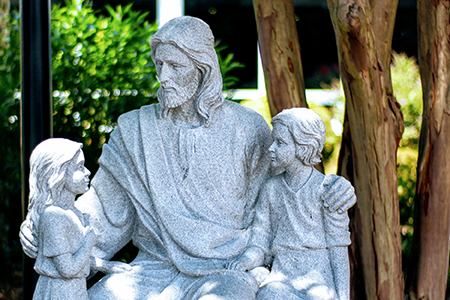 Jeremiah 1:4-5,17-19
Jeremiah 1:4-5,17-19
 1 Corinthians 12:31-13:13
1 Corinthians 12:31-13:13
 Luke 4:21-30
Luke 4:21-30
The Indian Residential Schools Truth and Reconciliation Commission (TRC), concluded in 2015, has begun an arduous but genuine healing of Canada’s relationship with the first peoples of the land by first, acknowledging the brutal wounds left by colonization, and paved ways for more open and candid dialogue, not only between the Canadian Government and the Indigenous peoples but also provided opportunities for Indigenous peoples to heal their wounds, reclaim their heritage and reimagine their cultures and identity. In truth, embracing both beauty and ugliness of the past, Canada as a nation must also bravely embark on a journey of truth-seeking and reconciliation in order to reimagine a Canadian identity that is characterized by honesty and trust; hope and compassion; justice and kindness; truth and reconciliation. Senator Murray Sinclair, the first First Nations justice in the province of Manitoba and chairman of the TRC in Canada, explains there are four questions that “every Indigenous person must answer in order to understand who they are” (Talaga 17). These questions are: “Where do I come from? Where am I going? What is my purpose? Who am I?” (Talaga 17-18). In fact, these are the fundamental questions that are not only central to the identity of Indigenous peoples and Canada as a nation but also to all of us sojourning as pilgrims on earth.
This week’s readings shed light onto these existential questions. In the first reading, God reveals to Jeremiah: “Before I formed you in the womb I knew you, and before you were born I consecrated you; I appointed you a Prophet to the nations” (Jer 1:4-5). In truth, God intimately knows each and every one of us before He forms us. So, “Where do I come from?” What is our history? God reveals to us in Jeremiah that each one of us comes from His loving heart and thoughtful design. Not only are we formed by God but also “consecrated” before birth; indeed we belong to God.
The next questions, “Where am I going?” and “What is my purpose?”, lead us into a deeper exploration of our call and mission as God’s children. Through Baptism, we are “appointed … a Prophet to the nations” (Jer 1:5). What is a prophet? Simply put, a prophet is someone who speaks the truth and proclaims God’s words. The Old Testament prophets demonstrate that this is a challenging job to say the least; it takes courage and full confidence in God as each perseveres against the world’s current. Our faithful God reassures Jeremiah, and indeed all of us, “They will fight against you; but they shall not prevail against you, for I am with you” (Jer 1:19).
Our sacred call to be prophets not only guides our purpose in life but also our direction. How would we know our purpose and direction; to what rhythm shall we dance? Indeed, the pulse – the beating heart and the very essence of the Church – is animated by the Holy Spirit. In the Gospel of Luke, Jesus is “filled with the power of the Spirit” as he begins his public ministry in his hometown, Nazareth (Lk 4:14). The Spirit empowers Jesus to boldly proclaim Isaiah’s prophetic words, “The Spirit of the Lord is upon me, because he has anointed me to bring good news to the poor [...] to proclaim release to the captives and recovery of sight to the blind, to let the oppressed go free” (Lk 4:18-19). If we allow the Spirit to fill our hearts and receive these words with humility and trust, then they will surely be fulfilled in our hearing (ref. Lk 4:21).
What does this Spirit look, feel, or sound like? Like a breath of fresh air, we can only know the Spirit through its impact. St. Paul explains in his letter to the Galatians, “the fruit of the Spirit is love, joy, peace, patience, kindness, generosity, faithfulness, gentleness, and self-control” (Gal 5:22). Therefore, where there is love, there is Spirit. In addition, Paul reminds us that without love, none of our gifts matters: “If I have prophetic powers, and understand all mysteries and all knowledge, and if I have all faith, so as to remove mountains, but do not have love [...] I am nothing” (1Cor 13:2).
Finally, the question of “Who am I?” beautifully sums up the previous three questions. Jeremiah reminds us that we are God’s beloved and chosen ones: we are known, formed, and consecrated by God. St. Paul emphasizes that without love, we are “nothing” in his letter to the Corinthians. Most importantly, we are called to be God’s prophets; to proclaim the good news, freedom and sight to all peoples in spite of oppositions and challenges. Who we are - our true identity - reflects the face of God. Our true “self” as willed by God celebrates God’s love, prompting us to live with honesty and trust; hope and compassion; justice and kindness; truth and reconciliation.
Works Cited:
Talaga, Tanya, CBC Massey Lecture - All Our Relations: Finding the Path Forward. Canada: House of Anansi Press Inc., 2018.
